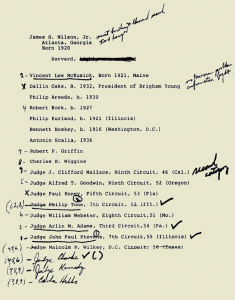Some Modest Predictions on the Severability of the Individual Mandate
The Court’s decision on the severability of the individual mandate may be the aspect of the PPACA litigation that is most difficult to predict. If the Court holds that the individual mandate is constitutional, then severability won’t be an issue in the first place. If severability does arise, whether and how the Court will sever the mandate is unclear. In part, this is because of problems with severability doctrine itself. Notwithstanding over a century of cases on the issue, the Court has had a hard time settling upon a definitive severability test. Sometimes the emphasis has been on legislative intent. Other times the focus has been on whether the constitutional remainder can function without the invalid part. Still other times the Court has severed or refused to sever without acknowledging the doctrine at all. The oral argument on severability reflected this state of affairs, as the Justices spent a considerable amount of time exploring the merits of several possible tests. Without knowing the doctrine, it is difficult to anticipate a result.
In part, the unpredictability also reflects the absence of a completely satisfying way to sever the mandate if it is unconstitutional. Because the PPACA lacks a severability clause, covers such a diversity of topics, and reflects a variety of legislative compromises, it is hard to identify a clear legislative intent with respect to severability. Because the invalidation of the mandate will render certain aspects of the core health-care reforms financially problematic, it is unsatisfying to focus exclusively on the textual separability of the mandate from surrounding provisions. And because courts are poorly equipped to appreciate the complexities of health care policy, it seems problematic to base severability on anticipated financial implications.
That being said, I think we can reasonably make a couple of predictions about this aspect of the decision. First, if the Court holds that the individual mandate is not severable, that holding will rest on the votes of the conservative Justices, who generally seemed much more skeptical of severability than their counterparts during oral argument.

